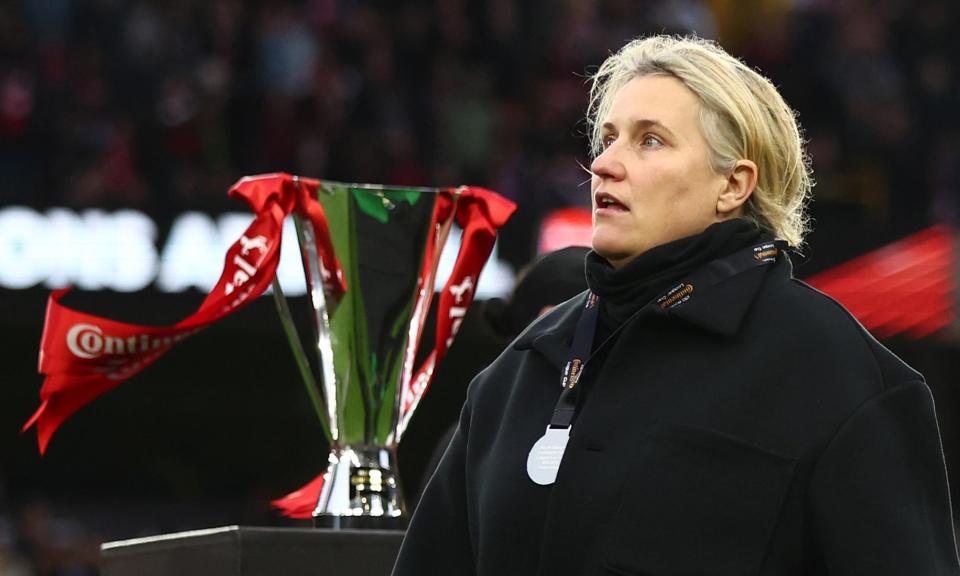Hayes’ Chelsea legacy is untarnished even if final season ends trophyless

Emma Hayes steps into the technical area at the Estadi Olímpic on Saturday after a draining few weeks on and off the pitch. The task is huge. Over two legs, Hayes must navigate Chelsea past a Barcelona side who are laden with World Cup stars and play the most delicious football to reach the Champions League final.
The Champions League is the only trophy to have eluded the manager during her 12 years with Chelsea and twice in the past three seasons Barça have stood in their way – inflicting a bruising 4-0 defeat in the Gothenburg final in 2021 and last year winning 2-1 on aggregate in the semi-finals.
Chelsea go into this tie more depleted and exhausted, a hefty injury list combined with an intense schedule taking a toll. The 3-0 victory over Aston Villa on Wednesday night will have lifted spirits, but the pain of a Continental Cup final loss to Arsenal followed by a 2-1 defeat by Manchester United in the FA Cup semi-finals, either side of an international break, will have scarred. Back-to-back defeats under Hayes are so unheard of that you had to travel back 92 competitive games to December 2021 to find the last time it happened.
Related: Women’s Champions League: where the semi-finals will be won and lost
At the start of March there was talk of a historic quadruple, Hayes having been part of the Arsenal setup that achieved the feat in 2007 as assistant manager to Vic Akers. Now, whisper it, a departure from club football after a trophyless season, with Barcelona firm favourites to reach a fifth final in six years and Manchester City level on points with the reigning Women’s Super League champions, is far from unlikely.
While Chelsea have faltered, Hayes, who takes over the US women’s national team this summer, has faltered too. In March she described relationships between players as “inappropriate”, the same term she had used to describe relationships between players and managers, before expanding on the difficulties of managing players in relationships. She later apologised for her poor choice of words and said: “I let myself down.” Two and a half weeks later Hayes pushed her Arsenal counterpart, Jonas Eidevall, at the end of the League Cup final and criticised “male aggression” when discussing Eidevall’s touchline manner.
She was right to correct her wording in regard to relationships between players but also deserved some benefit of the doubt. Did those cancelling her online or writing critically genuinely believe Hayes thinks player-player relationships are the same as player-manager relationships and is ignorant to the power imbalances at play with the latter? Unlikely.
Was she right to describe Eidevall’s antics as “male aggression”? No, but was criticising his touchline manner, whether you agree with it or not, legitimate, albeit an apparently diversionary tactic to take the heat off her players for a poor performance? Yes.
After the international break, when asked to revisit her use of the term “male aggression”, Hayes recited the final lines of Robert Frost’s poem Choose Something Like a Star: “So when at times the mob is swayed, to carry praise or blame too far, we may choose something like a star, to stay our minds on and be staid.”
After both events Hayes came in for heavy criticism. She has since been reserved in press conferences, evasive, hesitant even. She seems weary and wary like never before. This is a huge shame. Hayes has spent more than a decade crafting a relationship of mutual respect with journalists and many fans. Criticism is important, but context is important too.
The culture now, in society generally, is to cancel anyone in the public eye who misspeaks or says something you disagree with . There is no room for error, no room for discussion or debate, no benefit of the doubt and no room for nuance.
People expect perfection and quite extraordinarily Hayes has been a victim of meeting that high an expectation for so long. She has become a spokesperson for women’s football, a role she has embraced while recognising its significance. Few have had the confidence to speak so openly and honestly on so many issues around women’s football, or on the struggles faced by women generally, and that has driven change.
Against the backdrop of extraordinary performances on and off the pitch, she has suffered emotional and physical traumas: the loss of one of the twins she was carrying in 2018, an emergency hysterectomy in 2022 and the death of her father in 2023. During that time she has barely stopped, winning five of her six WSL titles, four of her five FA Cup winner’s medals and two League Cups. We all have dips in form, in different ways, and that Hayes has had so few in this context is hugely impressive.
Does Hayes have a right to make mistakes, be weary and be wary? Yes. Does she deserve to have recent weeks on and off the pitch, or even a potentially trophyless season, tarnish or define her Chelsea tenure? No.
Hayes has nothing more to prove. She deserves the change that international management will bring to her day-to-day life when she takes on the US role at the end of the season. She deserves to escape to the country where she experienced, as a young coach, how the status of the game there has created an army of fighters confident in speaking out on key issues, and where the pressure on her as a lone voice will be lifted. And she deserves to be in an environment where the standards match hers and she doesn’t have to fight for every crumb.

